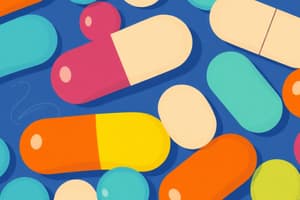Podcast
Questions and Answers
What is a notable skin manifestation associated with barbiturate use?
What is a notable skin manifestation associated with barbiturate use?
- Itching and swelling
- Dry skin and peeling
- Blisters over pressure points (correct)
- Red rashes all over the body
Diminished bowel sounds are a gastrointestinal manifestation connected to barbiturates.
Diminished bowel sounds are a gastrointestinal manifestation connected to barbiturates.
True (A)
Name the symptom associated with barbiturates that affects body temperature.
Name the symptom associated with barbiturates that affects body temperature.
hypothermia
Blisters over pressure points are referred to as __________.
Blisters over pressure points are referred to as __________.
Match the following features with barbiturate manifestations:
Match the following features with barbiturate manifestations:
Which of the following is NOT a therapeutic use of tricyclic antidepressants?
Which of the following is NOT a therapeutic use of tricyclic antidepressants?
Selective serotonin reuptake inhibitors (SSRIs) are classified as tricyclic antidepressants.
Selective serotonin reuptake inhibitors (SSRIs) are classified as tricyclic antidepressants.
What is one therapeutic use of tricyclic antidepressants?
What is one therapeutic use of tricyclic antidepressants?
Tricyclic antidepressants can be used for the treatment of ______.
Tricyclic antidepressants can be used for the treatment of ______.
Match the following terms with their definitions:
Match the following terms with their definitions:
Which of the following is a common finding in hyperglycemia?
Which of the following is a common finding in hyperglycemia?
Hypokalemia refers to a low level of potassium in the blood.
Hypokalemia refers to a low level of potassium in the blood.
What is one common cause of hypokalemia due to chronic toxicity?
What is one common cause of hypokalemia due to chronic toxicity?
What is lactic acidosis?
What is lactic acidosis?
The first step in the treatment of hyperglycemia is __________ measures.
The first step in the treatment of hyperglycemia is __________ measures.
Chronic diarrhea can contribute to hypokalemia.
Chronic diarrhea can contribute to hypokalemia.
Name one investigation that can help diagnose hypokalemia.
Name one investigation that can help diagnose hypokalemia.
Match the following conditions with their effects:
Match the following conditions with their effects:
Hypokalemia can result from poor dietary __________.
Hypokalemia can result from poor dietary __________.
Match the conditions with their relevance to hypokalemia:
Match the conditions with their relevance to hypokalemia:
Which condition is associated with severe refractory shock?
Which condition is associated with severe refractory shock?
Pulmonary edema is a respiratory condition associated with cough and dyspnea.
Pulmonary edema is a respiratory condition associated with cough and dyspnea.
What type of liver damage is indicated by centrilobular necrosis?
What type of liver damage is indicated by centrilobular necrosis?
Severe hypotension can be a sign of ______ shock.
Severe hypotension can be a sign of ______ shock.
Match the following medical conditions with their health system:
Match the following medical conditions with their health system:
Flashcards are hidden until you start studying
Study Notes
Antidepressants Overview
- Lithium: Used as a mood stabilizer, particularly in bipolar disorder.
- SSRIs: New class of antidepressants, effective for depression and anxiety disorders.
Tricyclic Antidepressants (TCAs)
-
Therapeutic Uses:
- Treats depression and panic disorders.
- Used for nocturnal enuresis (bedwetting) in children.
- Prophylaxis for migraines.
-
Skin Manifestations:
- Can cause blisters (bullae) over pressure points, particularly on hands and feet.
-
Gastrointestinal Issues:
- Notable for diminished bowel sounds, indicating reduced intestinal activity.
Distinguishing Features
-
Comparison to Barbiturates:
- Barbiturate poisoning may lead to hypothermia and bullae formation, distinct from TCAs.
-
Common Lab Findings:
- Hyperglycemia is common due to insulin release suppression from the pancreas.
- Electrolyte imbalances may occur, including hypokalemia or hyperkalemia.
- Lactic acidosis may develop.
Treatment Protocols
-
Immediate Interventions:
- Follow ABCs (Airway, Breathing, Circulation) measures for resuscitation.
-
Gastrointestinal Decontamination:
- Important in cases of overdose or severe toxicity.
-
Hypokalemia Management:
- Chronic toxicity risk due to loop diuretics, diarrhea, or inadequate dietary potassium intake.
Investigations
-
Cardiac:
- Monitor for severe refractory shock and hypotension.
-
Respiratory:
- Look for pulmonary edema, cough, and dyspnea.
-
Hepatic:
- Centrilobular necrosis may be indicative of significant liver damage.
-
Metabolic:
- Assess for signs of metabolic acidosis which could complicate patient condition.
Studying That Suits You
Use AI to generate personalized quizzes and flashcards to suit your learning preferences.




